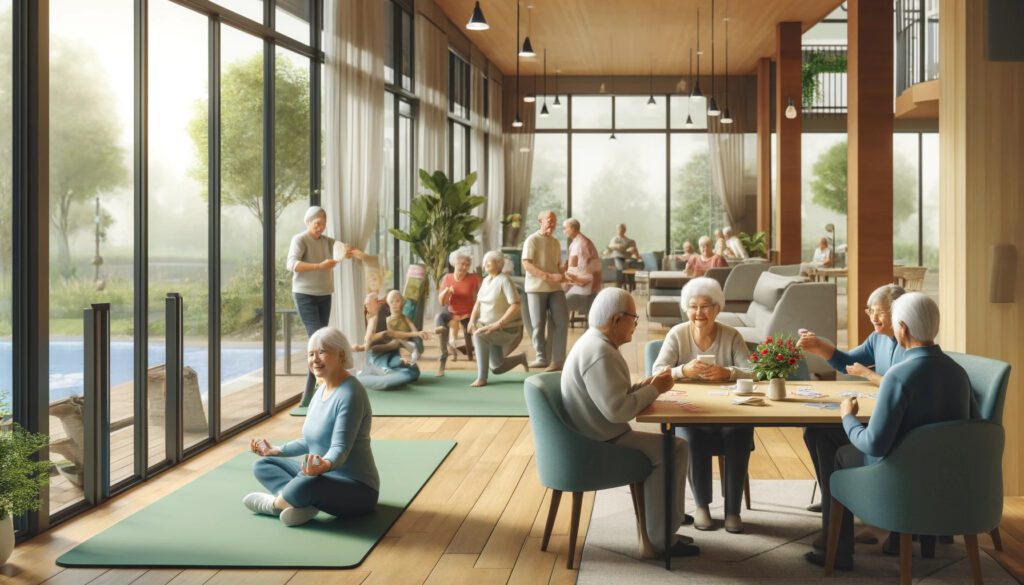Living arrangements for seniors can significantly impact their quality of life. Finding the right living situation is crucial for ensuring comfort, safety, and happiness. Martha, a vibrant 68-year-old retiree, embarks on a journey to discover the perfect living arrangement to suit her evolving needs.

Independent Living Arrangements for Seniors
Independent living communities are designed for seniors who are active and independent but prefer a more communal lifestyle. These communities offer various amenities and social activities to enhance the quality of life.
- Social Engagement:
- Clubhouse activities, group outings, and social events.
- On-site amenities like swimming pools, fitness centers, and libraries.
- Maintenance-Free Living:
- Landscaping, housekeeping, and home maintenance services included.
- Emergency maintenance services available 24/7.
- Safety and Security:
- Gated communities with security personnel.
- Emergency call systems in each residence.
Martha visited several independent living communities. She was impressed by the vibrant atmosphere and the wide range of activities offered. From yoga classes to art workshops, these communities promised an active, engaging lifestyle without the hassle of home maintenance.

Assisted Living Arrangements for Seniors
Assisted living facilities provide support for seniors who need help with daily activities but still want to maintain a level of independence. These facilities offer personal care services, medical assistance, and various recreational activities.
- Personalized Care:
- Assistance with bathing, dressing, and medication management.
- Customized care plans tailored to individual needs.
- Health and Wellness:
- On-site healthcare providers and access to physical therapy.
- Regular health screenings and wellness programs.
- Social and Recreational Activities:
- Daily activities, from gardening clubs to movie nights.
- Opportunities for social interaction and community involvement.
After researching assisted living options, Martha found that these facilities offered the right balance of independence and support. She appreciated the personalized care plans and the variety of social activities available to residents.
Aging in Place: Home Modifications for Seniors
Many seniors, like Martha, prefer to stay in their own homes as they age. Aging in place involves making home modifications to ensure safety and accessibility.
- Safety Improvements:
- Installing grab bars in bathrooms and stair railings.
- Removing tripping hazards and improving lighting.
- Accessibility Upgrades:
- Widening doorways and installing ramps.
- Lowering countertops and cabinetry for easier access.
- Technology and Assistive Devices:
- Medical alert systems and smart home devices.
- Automated lighting and voice-activated assistants.
Martha considered several modifications to her home. She installed grab bars in her bathroom, improved the lighting in hallways, and even invested in a medical alert system. These changes allowed her to maintain her independence while ensuring her home was safe and accessible.

Home Health Care Services for Seniors
For seniors wishing to remain at home but needing some assistance, home health care services can be a valuable resource. These services range from medical care to personal assistance, helping seniors maintain their independence.
- Medical Services:
- Skilled nursing care and physical therapy.
- Medication management and health monitoring.
- Personal Care:
- Assistance with daily activities like bathing, dressing, and meal preparation.
- Companionship and support for social activities.
- Flexible Options:
- Part-time, full-time, or live-in care options.
- Customized care plans to suit individual needs.
Martha found that home health care services provided the perfect balance of support and independence. A home health aide helped her with daily tasks, while a visiting nurse monitored her health, ensuring she could stay comfortably in her own home.
Long-Term Care Options for Seniors
Planning for potential long-term care needs is essential for future security. Various long-term care options are available, including assisted living, nursing homes, and memory care facilities.
- Assisted Living:
- Provides support with daily activities while promoting independence.
- Social and recreational activities to keep residents engaged.
- Nursing Homes:
- Offers 24/7 medical care and support for seniors with significant health issues.
- Comprehensive care plans and specialized medical services.
- Memory Care Facilities:
- Specialized care for seniors with Alzheimer’s or dementia.
- Structured activities and secure environments.
Although Martha hoped to remain independent, she knew planning for potential long-term care needs was wise. She researched various options, including assisted living and in-home care. By exploring long-term care insurance and understanding Medicaid's role, Martha felt more prepared for the future, ensuring she had a plan in place should her needs change.

Challenges and Practical Solutions
Navigating health care planning can be challenging. Here are common challenges and practical solutions:
- Complex Enrollment Processes:
- Solution: Seek assistance from Medicare counselors or online resources.
- Managing Multiple Medications:
- Solution: Use pill organizers and digital reminders.
- Affording Long-Term Care:
- Solution: Look into long-term care insurance and Medicaid options.
- Understanding Coverage Details:
- Solution: Regularly review your health care plan with a professional.
- Accessing Preventive Services:
- Solution: Take advantage of community wellness programs and Medicare-covered screenings.
Comprehensive Summary
This guide provided a detailed overview of health care planning for seniors, focusing on essential aspects such as understanding Medicare options, accessing preventive services, managing chronic conditions, utilizing home health care services, and planning for long-term care. Through Martha’s journey, seniors can see the practical steps and resources available to help them navigate their health care planning effectively.
Living Arrangements for Seniors : Conclusion
Effective health care planning for seniors involves understanding the resources available and taking proactive steps to ensure a healthy, fulfilling retirement. With the right strategies and support, seniors like Martha can navigate the complexities of health care and maintain their well-being.


